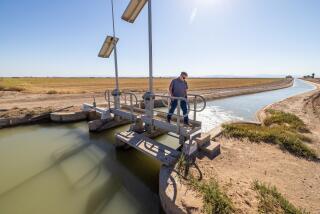Louise Willey, 81; Water Rights Crusader in Imperial Valley
- Share via
Louise Willey, a major force in the water politics and agricultural issues that dominate the Imperial Valley, has died of cancer at age 81. Willey died Tuesday at her home in Brawley.
Willey was a longtime leader in the movement to guard the valley’s entitlement to Colorado River water. With abundant water for irrigation, Willey’s family and other pioneers turned a barren wasteland into a $1-billion-a-year agricultural bonanza.
Willey often recalled how her father in the 1920s would sleep on the head gate of the family’s irrigation ditch to guard against water theft.
Using litigation and political muscle, Willey and others were determined that the rights established by their forebears would not be relinquished.
In the 1970s Willey fought a movement by the federal government to ban farms larger than 160 acres in reclamation zones from getting irrigation water. She argued that this would be the death knell of farming in the Imperial Valley.
“Tractor rallies” were organized in San Diego and Century City to gain attention for the farmers’ position. Willey went to Washington and persuaded Congress to pass legislation blocking the 160-acre rule.
“She saved the valley,” said Dave Nuffer, San Diego civic activist and Imperial County historian. “She was the valley.”
In the 1990s, Willey was alarmed at the move by the billionaire Texans, the Bass brothers, to buy large tracts of farmland in the Imperial Valley and sell the water used on the property to thirsty San Diego. She worried that once the valley began selling water, the region’s water rights and its agricultural economy would be imperiled.
“Maybe these people are here until they make a fast buck and then they’re gone,” Willey said. “My family’s now in its fourth generation. I don’t want to have to leave. I don’t want my grandchildren to have to leave because they don’t have any water.”
Twice widowed, Willey for years ran the family farm and cattle feedlot with her two sons. That fact invited comparisons with the role played by Barbara Stanwyck in the TV series “The Big Valley.”
She was a founder of the Brawley Cattle Call, the annual celebration of the livestock industry now in its 45th year.
“With little more than a wild idea and an eye on a mangy piece of bottom land, the Cattle Call Committee brought to life an event that has become a highlight of the year in Imperial Valley,” Valley Women Magazine noted in a profile of Willey.
In 1997 she was named Livestock Woman of the Year by the state Chamber of Commerce. She also served on the California Department of Food and Agriculture’s board of directors, the California Beef Council, and the National Cattle Feeders and Cattlemen’s Assn.
“She had a tenacity and an ability to accomplish things,” said Sue Giller, a longtime Imperial Valley journalist and now an official with the Imperial Irrigation District. “When Louise said something would get done, it would get done.”
In an editorial, the Imperial Valley Press said no one personified the pioneer spirit of the Imperial Valley better than Willey:
“She asserted herself in business in times when most women were still homemakers and she even did so in the cattle business, where the machismo pours from most cattlemen’s veins.”
Giller noted that Willey was afforded a respect offered to few women in the male-dominated world of agriculture and livestock.
“When she spoke, the men in the room were quiet and listened to her very intently,” Giller said. “The rest of us don’t always receive that privilege.”
Although her family had moved to the Imperial Valley in 1907--lured by the prospect of inexpensive land and abundant water--Willey was born in Avoca, Texas, because her father, a dairy farmer, had vowed that “no child of mine is going to be born in California.”
After her father’s death, her mother supported the family by running a boardinghouse for schoolteachers. Willey graduated from Woodbury College in Los Angeles, where she studied journalism, bookkeeping and accounting.
After working in a Los Angeles advertising agency, she returned to Brawley in 1940 to become co-publisher of the Brawley Shopper, a weekly newspaper.
She married cattle baron Albert John Kalin in 1946. He died in 1951, and in 1955 she married cattle buyer Russell Willey. He died in 1974.
Along with farming and feedlot operations in the Imperial Valley, the family also has had farming interests in Victorville.
Willey was expert on the flora and fauna of the Imperial Valley and a devotee of Western history and art.
In 1998 when the Imperial Irrigation District named a reservoir for Willey, Nuffer contributed a poem praising her as “a woman as formidable as the land.”
Willey is survived by her sons, Carson Kalin and Al Kalin of Brawley, and six grandchildren. Services were private.
More to Read
Sign up for Essential California
The most important California stories and recommendations in your inbox every morning.
You may occasionally receive promotional content from the Los Angeles Times.













